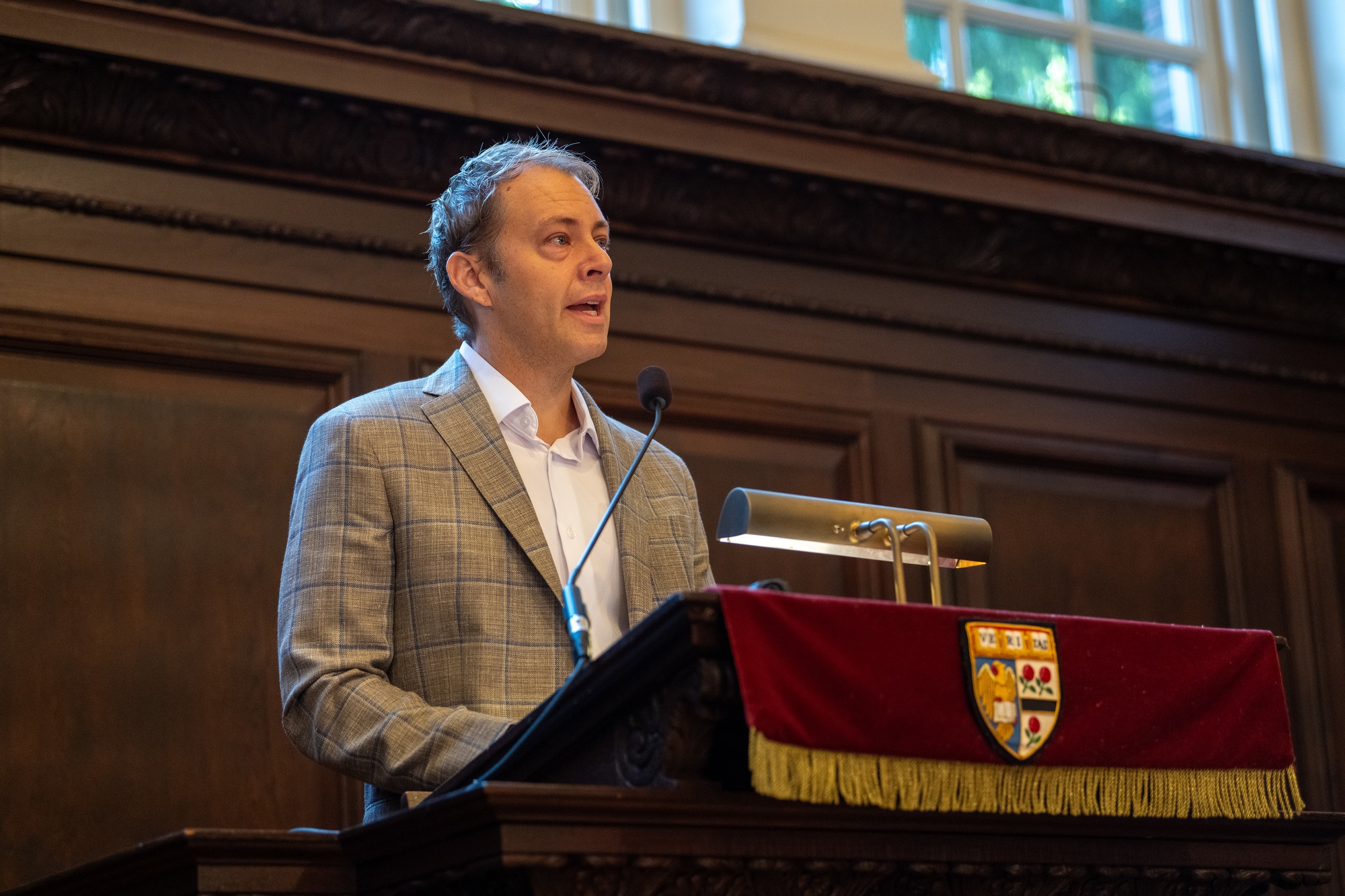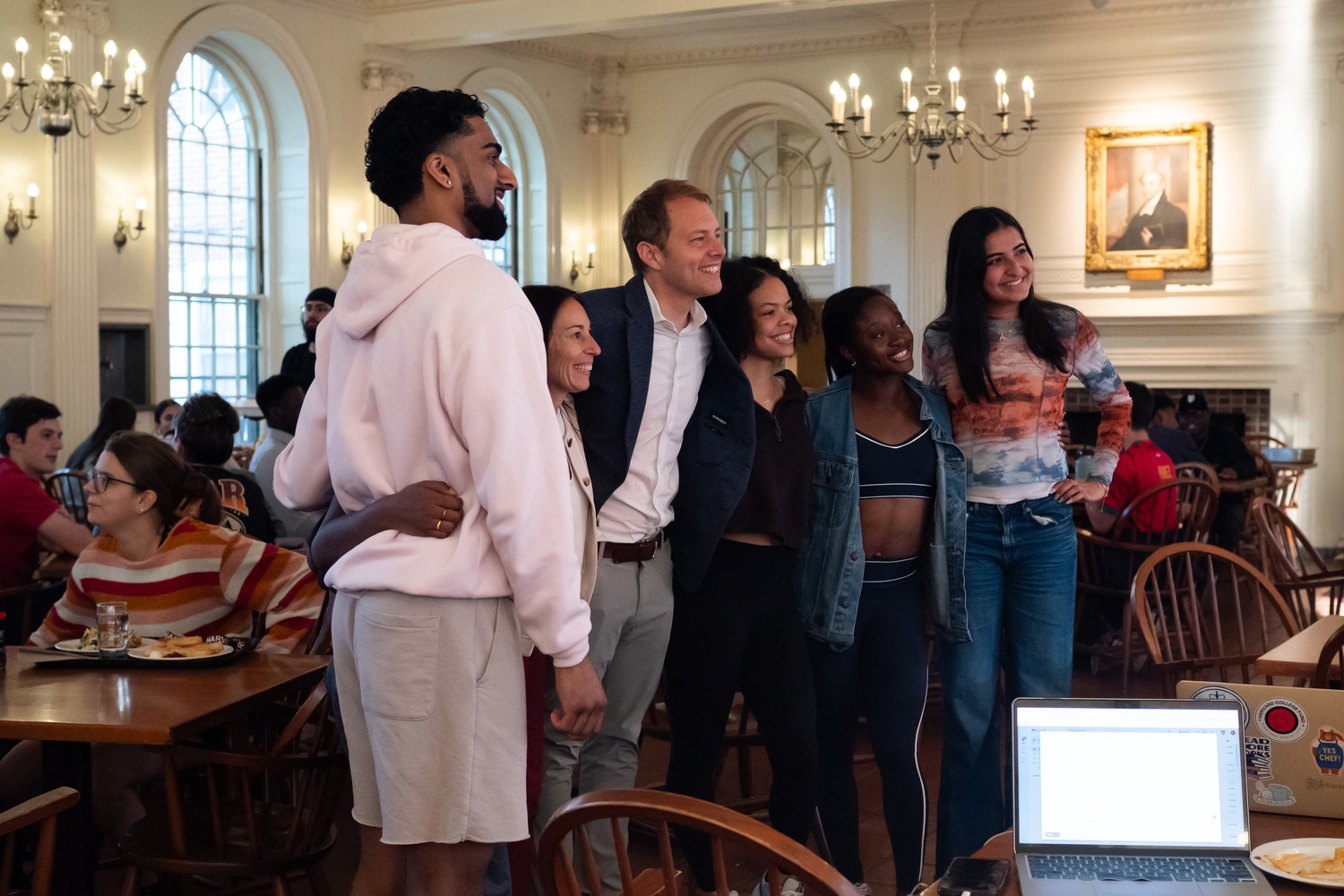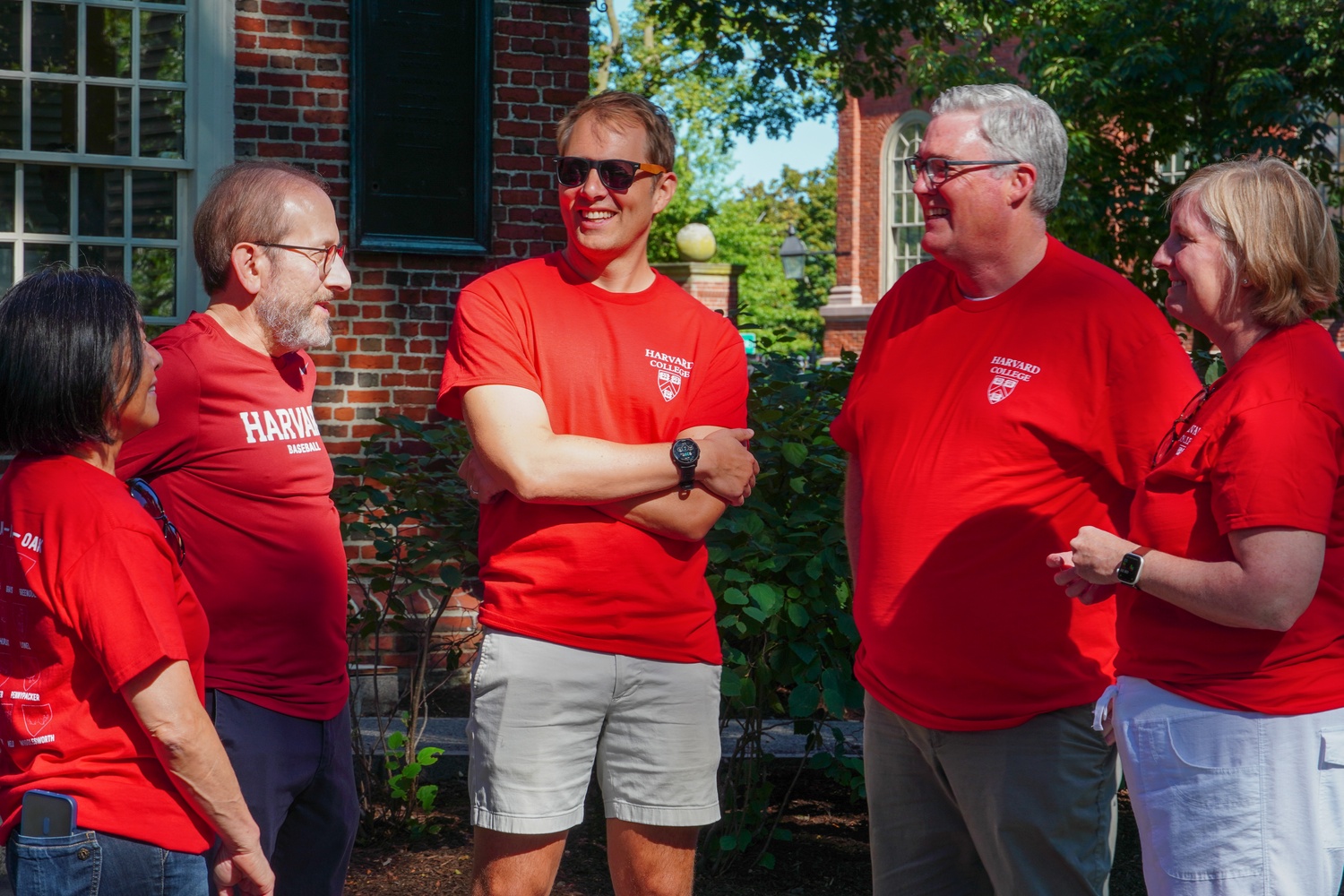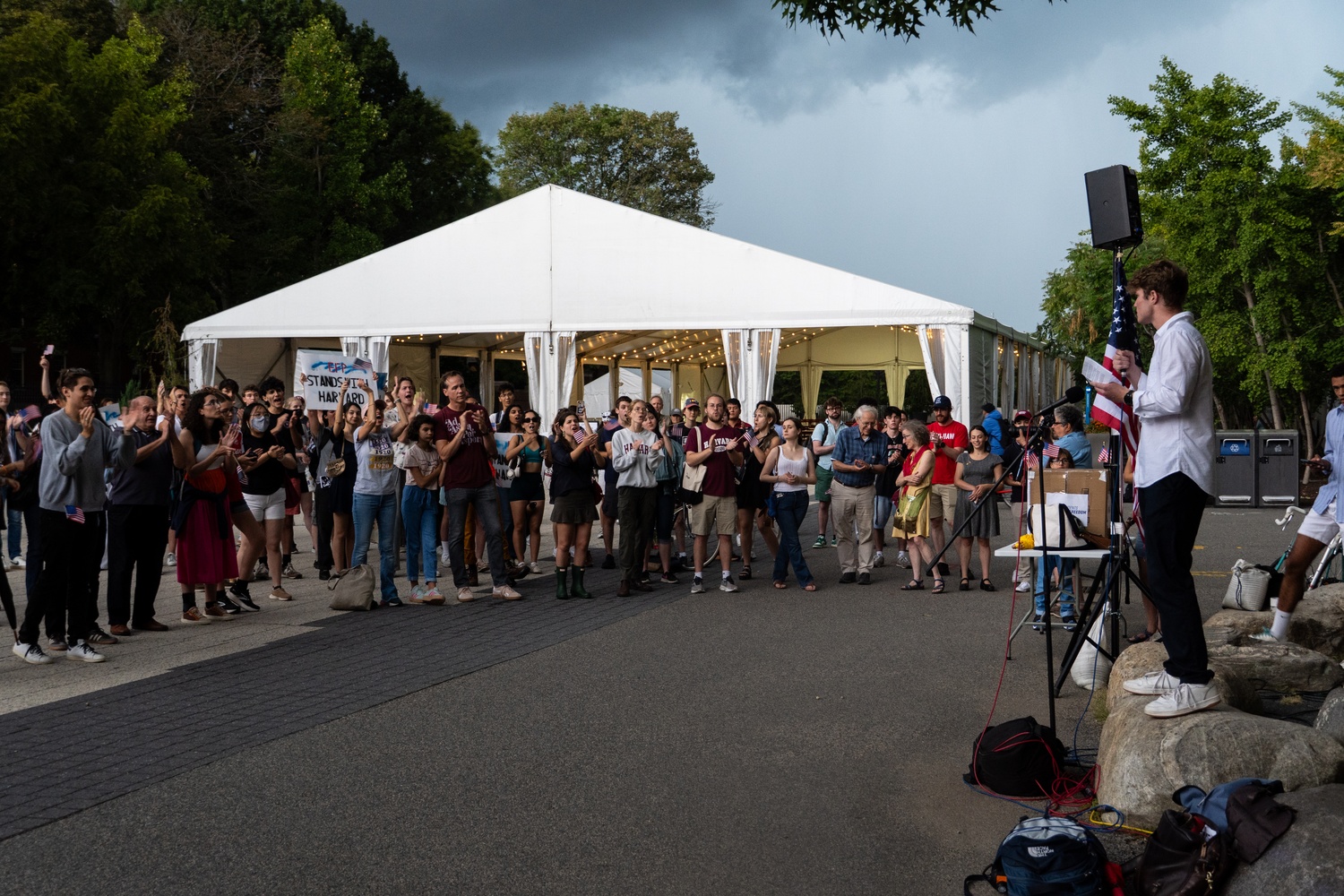
David Deming Tries To Be Straightforward. His New Job Is Anything But.
By Samuel A. Church and Cam N. Srivastava, Crimson Staff WritersDavid J. Deming, the new dean of Harvard College, is up and running at 5:45 a.m. most days.
His usual route follows the Charles River for at least five miles before he catches the sunrise from the John W. Weeks Memorial Bridge. Instead of listening to music, Deming runs in silence. He said the quiet helps clear his head.
Since being tapped to serve as Dean of Harvard College in May, the avid marathoner has tried his best to keep that rhythm, lacing up at dawn before heading to his new office in University Hall.
Students are still waiting to decide what they think of the new dean, who has made a point of talking to freshmen in Annenberg at least twice a week and created his own Instagram account to lean into his predecessor’s affable image.
But in Deming’s first months in office, the College has enacted a series of stark changes that have already reshaped campus life for some students but whose long-term effects remain to be seen.
In July, the College closed its offices for women, LGBTQ, and minority students — a change that Deming has yet to explain publicly but has privately described as a concession to new realities under the Trump administration. Administrators have investigated student groups under controversial new hazing policies. And faculty have continued a campaign to tighten attendance requirements and enhance academic rigor in undergraduate courses.
Deming, now in his forties, has been running at Harvard since 2005, when he started his Ph.D. at the Harvard Kennedy School. An expert on labor market trends, he joined the ranks of faculty at the Graduate School of Education in 2011, before securing full tenure and an additional appointment at HKS in 2016. He was also faculty dean of Kirkland House starting in 2020.
When Deming arrived at University Hall in July, he became the first College dean who had not previously held an appointment in the Faculty of Arts and Sciences since the deanship took its modern form in the 1990s. He was a finalist for the HKS deanship a year prior, but was ultimately passed over for Stanford University political scientist Jeremy M. Weinstein.
As an education policy expert turned administrator, Deming convinced his faculty peers and the College dean search committee that he was up for the task.
“If there’s one thing you need to know about David Deming in this role, it’s that he is fundamentally focused on and committed to the well being of all of our students, especially in their most difficult moments,” said Ian J. Miller, a Harvard History professor and Cabot House faculty dean.
Economist Turned Administrator
When Deming started his Ph.D., Harvard Economics professor Lawrence F. Katz ’91, his main advisor in graduate school, said he initially perceived Deming to be worried about whether he would fit into the department.
“I don’t remember him saying a lot in class,” Katz said. “He was someone who didn’t come with a strong economics background.”
Deming, originally from Nashville, completed his undergraduate education at Ohio State University before receiving his masters in public policy from the University of California Berkeley. He started at Harvard the same year.
But after submitting what Katz called an “excellent paper” on the effects of early childhood education on children’s outcomes, Deming found his footing, according to Katz.
“I think doing that paper and getting feedback was a big confidence builder for him,” Katz said.
Deming later published his own findings on the lasting effects of Head Start, a government program aimed at providing young children from low-income families with basic skills before they enter the school system. He found that while the boost in children’s test scores was temporary, Head Start participants were more likely to graduate high school and less likely to be in poor health later in life.
“I’ve always seen him very empathetic to others trying to make it as students and who may worry that they don’t belong,” Katz added. “I think his experiences will allow him to be very attuned to those issues.”
Alejandro J. Ganimian, a visiting professor at HGSE who studied under Deming while writing his doctoral dissertation in 2o15, said that Deming, to ease students’ stress, would tell them about a test he bombed.
“I also think he was quite human as a mentor,” he said. “It meant a lot that someone that we all admired a great deal had gone through similar struggles.”
Beth Schueler, a Stanford professor who completed a postdoctoral fellowship at HKS, said Deming was an important mentor even though he was not her assigned advisor. Schueler said she would leave memos in Deming’s mailbox with proposals and questions when she was struggling with project ideas.
“He would handwrite little responses and get right to the heart of, ‘Okay, cool idea. But this is the key challenge that you need to make sure you can address,’” she said.
It was stories like these that eventually caught the eye of former Dean of Freshmen Thomas A. Dingman ’67, who was helping the College vet potential faculty dean candidates to fill vacancies in five Houses in 2020.
“I loved his sparkle, his thoughtful observations about higher education, his commitment to making a difference in the experience,” Dingman said. “I just was left with the sense that he would be really well received by undergraduates.”
Deming and his wife, Janine M. Santimauro, were offered the position as faculty deans during the height of the Covid-19 pandemic. The pair was immediately tasked with keeping the Kirkland House community alive during distance learning and rising operating costs.

Sean D. Kelly, dean of the Arts and Humanities and former Dunster House faculty dean, said Deming’s ability to make tough decisions was evident early on in his tenure.
“We all confronted various pressures — the rising costs of dining services, for instance — which would cut into the other kinds of things that we could do in the House,” Kelly said. “He just had a very clear ability to say, ‘Look, here’s where the problem lies. And we’re all confronting it, and here’s the reason we’re all confronting it.’”
In 2022, when Kirkland won the Straus Cup — an annual prize awarded to the undergraduate house that accumulates the most wins in intramural sports — Deming’s Kirkland pride was on full display.
“More than once, when we were at their house for dinner, they brought it out to parade it in front of us — all in good cheer,” Kelly said.
‘Straight Shooter’
As a long-time HKS faculty member and academic dean, Deming has dealt with his fair share of controversy before leading the College.
In March 2024, HKS professor Tarek Masoud was facing an onslaught of national criticism for hosting controversial speakers on the Israel-Palestine conflict for his Middle East Dialogues series.
“I remember I got a text message from an unfamiliar number asking if I was okay,” Masoud said. “It was only after a couple of back-and-forths with this anonymous person who was checking in on me, who I knew was clearly friendly to me, that I realized, ‘Oh, this is David.’”
Masoud said the message from Deming stuck out because it came when some of his closer colleagues had chosen to stay silent. For him, Deming’s willingness to reach out was proof he was “a very good guy.”
In 2021, Deming was appointed academic dean — a role that entailed overseeing faculty hiring, promotions, and firings. Masoud said that though Deming rejected most of his requests in the role, he emerged from those dealings with the sense that Deming had taken him seriously.
“Seven out of 10 conversations that I had with David Deming as academic dean were him telling me no. But he’s able to explain why he’s not acceding to your request in a manner that makes you feel respected and allows you to understand his point of view,” Masoud said.
“He is a straight shooter, so if he tells you ‘yes,’ you can take it to the bank. If he tells you ‘no,’ you know it’s a no. When he says ‘no,’ it’s not like he’s saying ‘ask me again later’ or ‘lobby me,’” he added.
Many of Deming’s colleagues gave his tenure glowing praise, though a handful were reluctant to comment on how they viewed his leadership at the school.
HKS professor Mathias Risse, also the director of the Carr Center for Human Rights Policy, told The Crimson in 2024 that Deming was “difficult to work with as academic dean” as he was being considered for the HKS deanship.
Risse declined to be interviewed for this piece, and wrote in an email that the “ship has now sailed.”

In March, Deming and Dean of Undergraduate Education Amanda Claybaugh emerged as finalists to become the next College dean. After a drawn-out search process that lasted around nine months, Faculty of Arts and Sciences Dean Hopi E. Hoekstra named Deming the next dean in May, to the elation of many students in Kirkland House.
“Anyone that’s had even one conversation with David can tell how brilliant and joyful he is, which I think are two qualities that the dean needs to have,” Kirkland resident Harry J. Cotter ’25-’26 said in May.
‘How Could I Not Do It?’
On Sept. 12, Deming completed a rite of passage for Harvard administrators: delivering morning prayers during a service at Memorial Church. In his short address, he laid out the philosophy governing his approach to the new role.
“It would be easy to do only what is expected of me and no more,” Deming said. “But here’s what I vow instead. I hope to lead with moral, not positional authority.”
In an interview with The Crimson, Deming said that leading with moral authority means getting people on board with decisions by convincing them “it’s the right thing to do for our students, rather than because I’m the dean and I said so.”
“I was raised with a strong sense of right and wrong,” he said. “I really try not to do what I can get away with, but to do what’s right. And I think it’s important to set that example so that other people see it.”
His principled approach to the deanship echoes that of his predecessor, Rakesh Khurana, who was famous for repeating the College’s mission statement at the beginning of every meeting. But unlike Khurana, who kept a low profile during his first year as dean, Deming’s decisions have already sparked controversy.
Less than a month after he assumed office, the College shuttered the Women’s Center, Office for BGLTQ Student Life, and Foundation for Intercultural and Race Relations — a decision that caught the centers’ directors and their more than 50 student employees by surprise. In August, Deming told Peer Advising Fellows that the changes were motivated by external pressure outside the University.
Students condemned the College for closing the offices and enacting changes that mirrored demands from the Trump administration at a rally earlier this month.

“Many of the students here today may never have gotten to know a version of Harvard that celebrated its students’ identities,” Olivia F. Data ’26 said at the rally. “That seems to be the University’s intention.”
As Deming looks to gain the favor of the student body, he will become the new face of the office and policy changes under fire. Like Khurana, Deming has taken to social media to connect with students and introduce himself.
His Instagram account, where he posts podcast appearances and answers student-submitted questions, currently has more than 2,000 followers. Deming’s fan favorite posts include a “get ready with me” makeup tutorial and a dining hall taste test.
Miller, the Cabot House faculty dean, said he perceived Deming to be “eager to work through difficult problems, whether they are financial or institutional or social and cultural.”
In a September interview with The Crimson, Deming said that being College dean was not something he had even considered before the search for Khurana’s successor began last year. Instead, he saw applying for the job as a “responsibility.”
“I look at it as a stewardship role,” he said. “Being a tenured professor at Harvard and doing research and teaching for a living is a pretty great job and that’s all I ever wanted.”
“I really believe very deeply in what we do here, and the importance of Harvard in the world, and the importance of Harvard College in particular,” he added. “So if the leadership of the University thinks, in this time, that I am the right person to do that role, how could I not do it?”
—Staff writer Samuel A. Church can be reached at samuel.church@thecrimson.com. Follow him on X @samuelachurch.
—Staff writer Cam N. Srivastava can be reached at cam.srivastava@thecrimson.com. Follow him on X @camsrivastava.
